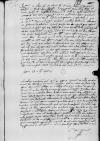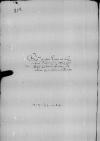List #2172
Ioannes DANTISCUS do Tiedemann GIESEHeilsberg (Lidzbark), 1539-07-04, postscript 1539-07-05
Regest polski:
Dantyszek zawiadamia Giesego o zgodzie króla [Zygmunta I] na przeniesienie terminu sejmu pruskiego na dzień św. Michała [29 września]. Zleca Giesemu zawiadomienie o tym sąsiadujących z nim członków Rady, sam zaś poinformuje wojewodę malborskiego [Jerzego Bażyńskiego], kasztelana gdańskiego [Achacego Cemę] oraz radę Elbląga i radę Gdańska. Napisał już o zmianie terminu do księcia [Albrechta Hohenzollerna].
Dantyszek przesyła Giesemu list otrzymany do podkanclerzego [Samuela Maciejowskiego], opisujący najnowsze wydarzenia.
Król podjął decyzję w sprawie kasztelanii elbląskiej, zanim dotarły do niego sugestie Dantyszka i członków Rady. Wskutek poparcia tego, który odmówił podpisania wspólnego listu [tj. kasztelana chełmińskiego Mikołaja Działyńskiego], godność powierzono mniej pożądanemu kandydatowi [Janowi Sokołowskiemu]. Dantyszek przewiduje dalszy niekorzystny rozwój sytuacji i niepokoi się o przyszły kształt Rady Pruskiej.
Dantyszek prosi Giesego o napomnienie doktora Mikołaja Kopernika, którego od dawna bardzo szanuje jako człowieka i uczonego, by odprawił konkubinę i nie pozwalał się dłużej zwodzić Aleksandrowi [Scultetiemu], którego Kopernik przedkłada nad innych kanoników. Dantyszkowi zależy, aby Kopernik sądził, że napomnienie wynikło z własnej inicjatywy Giesego.
| odebrano [1539]-07-06 Rękopiśmienne podstawy źródłowe:
Pomocnicze podstawy źródłowe:
Publikacje:
| ||||||||||||||||||||
Tekst + aparat krytyczny + komentarz Zwykły tekst Tekst + komentarz Tekst + aparat krytyczny
Reverendissimo in Christo Patri et Domino, domino
Reverendissime in Christo Pater et Domine, frater et amice carissime ac honorande.
Salutem et fraternam commendationem.
cf.
Quid praeterea de novis, quae aguntur, ad me scriptum est, ex reverendi domini
Evenit, quod recto suspicabar futurum, quemadmodum et Dominationi Vestrae Reverendissimae cf.
Qui ut Dominationem Vestram Reverendissimam longissimo tempore sospitet prosperetque in omnibus, ex animo cupio.
Datae
Reverendissimae Dominationis Vestrae frater integerrimus
Postscript:
Audivi venturum ad Dominationem Vestram Reverendissimam eximium et multae eruditionis virum, dominum doctorem
Datae V Iulii.
[1 ] Dantiscus asked
[2 ] The letter from Maciejowski has been preserved together with the news enclosed, described here as scheda addita
[3 ] Anna Schilling, Nicolaus Copernicus’ housekeeper and his alleged concubine (cf.

